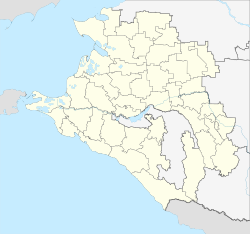Anapa
| Anapa (English) Анапа (Russian) |
|
|---|---|
| - Town - | |
 Location of Krasnodar Krai in Russia |
|
|
|
|
|
|
|
|
|
|
| Administrative status (as of May 2013) | |
| Country | Russia |
| Federal subject | Krasnodar Krai |
| Administratively subordinated to | Town of Anapa |
| Administrative center of | Town of Anapa,Anapsky District |
| Municipal status (as of June 2009) | |
| Urban okrug | Anapa Urban Okrug |
| Administrative center of | Anapa Urban Okrug |
| Mayor | Sergey Sergeyev |
| Statistics | |
| Population (2010 Census) | 58,990 inhabitants |
| - Rank in 2010 | 280th |
| Time zone | MSK (UTC+03:00) |
| Founded | 14th century |
| Town status since | 1846 |
| Postal code(s) | 353440—353458 |
| Dialing code(s) | +7 86133 |
|
|
|
| on | |
Anapa (Russian: Ана́па) is a town in Krasnodar Krai, Russia, located on the northern coast of the Black Sea near the Sea of Azov. Population: 58,990 (2010 Census);53,493 (2002 Census);54,796 (1989 Census).
The area around Anapa was settled in antiquity. It was originally a major seaport (Sinda) for the Natkhuay tribe of the Adyghe people and then the capital of Sindica. The colony of Gorgippia was built on the site of Sinda in the 6th century BCE by Pontic Greeks, who named it after a king of the Cimmerian Bosporus. In the 2nd and 3rd centuries BCE, Gorgippia flourished as part of the Bosporan Kingdom, as did its guild of shipowners, which controlled maritime trade in the eastern part of the Black Sea. A fine statue of Neokles (a local potentate, son of Herodoros) was unearthed by Russian archaeologists and is now on exhibit at the Russian Museum. Gorgippia was inhabited until the 3rd century CE, when it was overrun by nomadic tribes. These tribes, of Circassian or Adyghe origin, gave Anapa its modern name.
Later the Black Sea littoral was overrun by successive waves of Asiatic nomads, including the Sarmatians, Ostrogoths, Huns, Avars, Gokturks, Khazars, Circassians, and Tatars. The settlement was renamed Mapa by the Genoese at the turn of the 14th century. Genoese domination lasted until the arrival of an Ottoman fleet in 1475. The Turks later built a fort against the Russian Cossacks. The fortress was repeatedly attacked by the Russian Empire and was all but destroyed during its last siege in 1829. The town was passed to Russia after the Treaty of Adrianople (1829). See Russian conquest of the Caucasus#Black Sea Coast. It was included in Black Sea Okrug of Kuban Oblast and was granted town status in 1846.
...
Wikipedia



